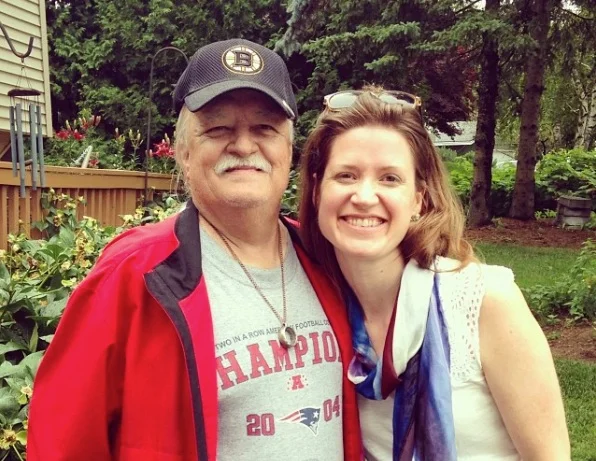When there is no right or wrong decision
DC and me, July 2014.
When I look back at my college career at the University of Maine, many of my fondest memories revolved around being a member of the University Singers under the direction of Dr. Dennis K. Cox.
DC, as he is affectionately known to hundreds of Singers alumni, is an expressive, sensitive conductor with impeccable musical taste who could easily have taught at a conservatory somewhere, working only with the most serious classically trained singers. However, DC valued the vibrant energy that accompanied our more diverse group. We had voice majors, sure, but also piano majors, clarinet majors, and singers studying everything from engineering to forestry to education to biology. And though we all took the music very seriously, there was always room for wacky traditions and wild shenanigans. DC always gave us plenty of latitude to bond as a group, and he was always enthusiastically included in the goings-on.
I have learned many things from DC, including the beauty of choral literature and the magic that can be created by a joyful group of people unified in their sound and their intent. However, one lesson I’ve never forgotten was one applicable not to choir, but to life in general. He told us, “When faced with a decision, it doesn’t matter what you choose, as long as you commit to it one hundred percent.”
DC’s career is a testament to this idea. Originally from Nebraska, he took his position at the University of Maine in 1978, where he embraced his role as Director of Choral Activities until his retirement just a few years ago. He still makes his home in Maine with his lovely wife Liz and is enthusiastic about all things New England. He can often be seen sporting gear from multiple New England sports teams simultaneously, and he and Liz make an annual pilgrimage down to Fort Myers, Florida for the Boston Red Sox’s spring training.
Instead of striving for ever more prestigious roles at ever more prestigious universities trying to impress other people or to make up for something that was missing, DC invested deeply in the opportunities and people right in front of him. He was respected and valued on his own terms. He attained professional success and personal satisfaction while mentoring thousands of young adults and building a hugely respected and sought-after program. Nothing was missing at all.
As an adult, I have taken DC’s advice and example to heart. Though life isn’t always smooth, there is a confidence to my decision-making that originates in those early lessons from DC. It’s not that I always make the right decision; it’s that I understand that the “right or wrong” decision is most often an illusion. When choosing where to go to college, what to major in, which city to live in, which job to take, and when to make a change, what matters isn’t choosing A or B — it’s forging ahead to follow through on the choice you made.
There are always opportunities for pivots in life, and those present additional decisions; the choice to stay the course is just as valid as the choice to shake things up. Any decision can be the “right one” if our choice is not based in fear: Fear of regret, fear of missing out, fear of what others will think, fear of making a mistake. There are no do-overs, but we can always move forward. Questioning our decisions is a trap. If we don’t like where we’ve ended up, we can make new decisions from there based on where we want to go and what we want to contribute. It doesn’t have to be about what went wrong in the past — instead, we can focus on the commitment we want to make for the future.
DC knew his audience of college students well and understood that we would face many important decisions in quick succession and, being young, were new at the art of making our own choices. His advice was both soothing and inspiring to my nineteen-year old self; it made an impact on me that continues to this day.
No matter what, there will be twists and turns in life that are wholly unpredictable from where we’re standing now. If we remember DC’s words, we can rededicate ourselves to our commitments and make the most of what we have and what’s to come. If we follow his example, we will do it joyfully, changing lives as we go.
